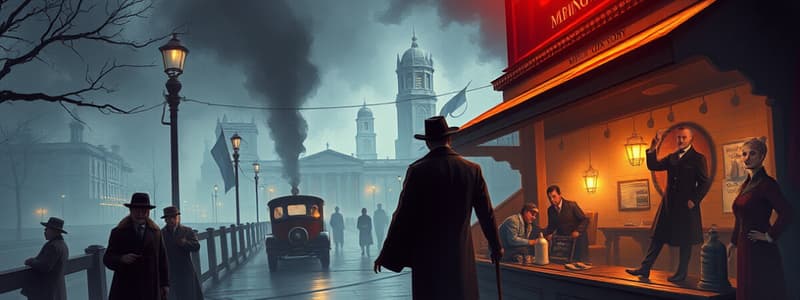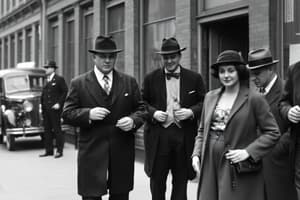Podcast
Questions and Answers
What does Prohibition refer to?
What does Prohibition refer to?
- Manufacture of alcohol was allowed from 1920-1933
- The regulation of alcohol production
- The promotion of alcohol sales
- The prevention by law of the manufacture, transportation, and sale of alcohol from 1920-1933 (correct)
Who was Billy Sunday?
Who was Billy Sunday?
An evangelist who preached against the evils of drinking.
What were speakeasies?
What were speakeasies?
Hidden saloons and nightclubs where illegal alcohol was obtained and consumed.
A bootlegger is someone who legally sells alcohol.
A bootlegger is someone who legally sells alcohol.
What is Fundamentalism?
What is Fundamentalism?
Who was Clarence Darrow?
Who was Clarence Darrow?
What was the Scopes Trial about?
What was the Scopes Trial about?
What characterizes a flapper?
What characterizes a flapper?
What is a double standard?
What is a double standard?
Who was Jack Dempsey?
Who was Jack Dempsey?
What is significant about Charles A. Lindbergh?
What is significant about Charles A. Lindbergh?
What is George Gershwin known for?
What is George Gershwin known for?
Who was Georgia O'Keeffe?
Who was Georgia O'Keeffe?
Who was Sinclair Lewis?
Who was Sinclair Lewis?
What is F. Scott Fitzgerald famous for?
What is F. Scott Fitzgerald famous for?
What was Edna St. Vincent Millay known for?
What was Edna St. Vincent Millay known for?
What did Ernest Hemingway do during WWI?
What did Ernest Hemingway do during WWI?
What does NAACP stand for?
What does NAACP stand for?
Who was Zora Neale Hurston?
Who was Zora Neale Hurston?
What was James Weldon Johnson's role in the NAACP?
What was James Weldon Johnson's role in the NAACP?
Who was Marcus Garvey?
Who was Marcus Garvey?
What is the Harlem Renaissance?
What is the Harlem Renaissance?
Who was Claude McKay?
Who was Claude McKay?
What did Langston Hughes write about?
What did Langston Hughes write about?
Who was Paul Robeson?
Who was Paul Robeson?
What is Louis Armstrong renowned for?
What is Louis Armstrong renowned for?
What is Duke Ellington famous for?
What is Duke Ellington famous for?
Who was Bessie Smith?
Who was Bessie Smith?
Flashcards are hidden until you start studying
Study Notes
U.S. History Chapter 13 Study Notes
- Prohibition lasted from 1920 to 1933, banning the manufacture, transportation, and sale of alcohol in the U.S.
- Billy Sunday was an influential evangelist who spoke against alcohol consumption, promoting a resurgence of virtue and religion during Prohibition.
- Speakeasies were underground clubs where people secretly gathered to drink illegal alcohol during Prohibition.
- Bootleggers smuggled alcohol, deriving the term from their method of hiding liquor in the legs of their boots.
- Fundamentalism is a Protestant movement that interprets the Bible in a literal, non-symbolic way.
- Clarence Darrow was a prominent defense attorney known for representing John Scopes in the famous Scopes Trial.
- The Scopes Trial was a landmark case debating the teaching of evolution versus creationism in public schools, reflecting tensions between science and religion.
- Flappers were modern young women in the 1920s who challenged traditional norms through their fashion and lifestyle choices.
- The Double Standard granted men greater sexual freedoms compared to women, placing stricter behavioral expectations on women.
- Jack Dempsey was a heavyweight boxing champion who lost to Gene Tunney in a notable 1927 match.
- Charles A. Lindbergh made history as the first person to fly solo nonstop across the Atlantic Ocean.
- George Gershwin was a Jewish composer celebrated for blending American jazz with concert music, creating an American musical identity.
- Georgia O’Keeffe was an artist known for her vivid paintings that celebrated New York's landscapes and urban life.
- Sinclair Lewis was the first American novelist awarded the Nobel Prize in Literature.
- F. Scott Fitzgerald coined the phrase "Jazz Age" for the 1920s, capturing the era's themes in works like "The Great Gatsby."
- Edna St. Vincent Millay wrote poetry that celebrated youth and independence, breaking from traditional societal constraints.
- Ernest Hemingway, a war veteran, became renowned for his literary criticism of the romanticization of warfare.
- The NAACP (National Association for the Advancement of Colored People) advocated for civil rights and against racial violence; founded by W.E.B. Du Bois among others.
- Zora Neale Hurston was a prominent African-American author whose works explored the experiences of Southern Black life, stemming from her roots in Eatonville, Florida.
- James Weldon Johnson was a multi-talented individual who worked as a poet and lawyer, serving as the executive secretary of the NAACP.
- Marcus Garvey was a Jamaican immigrant and proponent of Black nationalism, founder of the Universal Negro Improvement Association.
- The Harlem Renaissance was a cultural movement in the 1920s celebrating African-American artistic expression.
- Claude McKay was a Jamaican writer whose militant poetry encouraged African Americans to actively resist racism and discrimination.
- Langston Hughes was a key figure in the Harlem Renaissance, known for poetry that depicted the struggles of the African-American working class.
- Paul Robeson was a prominent figure in theatre and music; known for playing Othello, he championed African-American rights.
- Louis Armstrong was a revolutionary jazz trumpet player whose talent significantly shaped the jazz genre and popular music.
- Duke Ellington was a renowned pianist and composer leading a successful jazz orchestra, known for pieces like "Mood Indigo."
- Bessie Smith, recognized as one of the decade's top blues singers, became the highest-paid black artist of her time.
Studying That Suits You
Use AI to generate personalized quizzes and flashcards to suit your learning preferences.




